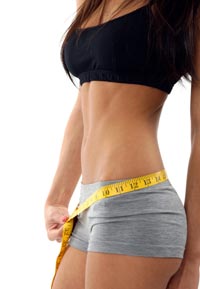Synergizing Your Hormones for Weight Loss
The world of fitness and weight loss can be extremely confusing and frustrating. Who are you to believe? Low fat. Low carb. High protein. High fat. Zone, Atkins, South Beach. The list seems to go on and on. Then there are the workouts: Pilates, Curves, Cuts, cross-training, cardio, weight training. It is no wonder why so many people have difficulty sticking to a regimen. For many, all of this confusion can impede them from even starting.
Imagine for a moment that there was a pill that could not only cause your body to burn fat but also gain muscle and strength. Blockbuster drug, right? Not quite. While drugs like this exist, the bad news is that, like many, they are linked to a slew of health conditions, including cancer and sexual dysfunction.
But the fact is that your body actually makes chemicals—perfect and natural forms—with no side effects. These chemicals are called hormones. The secret lies in the understanding of how you can naturally stimulate your body to produce more of these hormones to burn fat and build muscle.
Once you understand the physiology of the human body, the need for the quick fix diet or drug will no longer matter. Human physiology has been studied, and the methods I will share are absolute and backed by science. This means that they can work for everyone.
The Big Four
An understanding of four important hormones can help create huge breakthroughs in your body’s ability to lose weight. Although there are more hormones involved in weight loss and muscle gains, we will focus on these four major players.
Testosterone
Testosterone is an anabolic hormone. This means it is responsible for building strength and endurance in your muscles. It also allows your body to efficiently use fat as energy. The more intense your workouts are, the more testosterone will be produced, which also stimulates your body to burn fat when you are not working out due to the fact that the testosterone stimulating effects may last up to forty-eight hours after intense workouts.
Growth Hormone
Growth hormone (GH) is responsible for general growth throughout our lives. In fact, there are various genetic disorders that cause low or high levels of GH to be produced, thus affecting normal growth. Growth hormone stimulates muscular growth and is also stimulated when intense cardiovascular training or heavy weight training is performed. These hormonal responses trace back to our primitive origins and were created for survival.
Estrogen
Estrogen, a hormone more dominant in woman but present in men, also plays a role in weight loss and human performance. Estrogen is important for bone formation and allows the body to utilize fat for energy (fat burning).
Insulin
One of the biggest players in your body’s fat loss ability is insulin. GH and insulin are inversely related. This simply means that when there are high levels of insulin in the body, GH is naturally inhibited through complicated feedback mechanisms in the body. Insulin is a necessary hormone. It basically acts as the gatekeeper between getting sugar from the blood into the cells, where they are needed for energy production for all cellular functions. All the cells of the body require sugar or fat to perform bodily functions. In fact, the brain can only function on sugar, whereas other tissues can utilize either fat or sugar for energy.
The bad news is that excess insulin production causes fat deposition. This means that in the presence of high amounts of insulin in the blood, the body converts the sugar and stores it as fat. High circulating amounts of insulin can be extremely detrimental to the health of our bodies. Studies have shown that high insulin levels promote atherosclerosis, inflammation in blood vessels, and water retention, all of which lead to high blood pressure.
Now that we understand the harmful effects of insulin, how do we keep appropriate, healthy levels? Insulin is stimulated when the body breaks down the foods we eat into sugar. The faster we convert food into sugar, the quicker insulin production will be triggered. Foods that are processed and refined, including white flours, soft drinks, and even fruit juices, cause unnatural spikes in our sugar levels, prompting our body to produce insulin in a fast and unnatural way. As a result, over time, our body becomes nonresponsive to insulin, which can lead to insulin resistance or type 2 diabetes.
Now that we understand how hormones affect our body’s ability to lose weight, what can we do to harness these hormones to optimize fitness, lose weight, and build muscle? How do we apply the knowledge of these hormones to our workouts for maximum muscular gains and fat loss?
Get Intense
Whether it be cardio training or weight training, the common thread must be high intensity. This allows for the greatest hormonal response for muscular gains and fat loss. Studies show that the primary source of your energy during your workout will be the opposite during recovery. In other words, if you burn sugar during your workout, you will be a fat burner during recovery. This is a key concept. For those that enjoy low- to medium-intensity cardio, the body will burn fat during the workout only and will burn sugar for energy during recovery. Don’t you want your body burning fat when you are not working out?
Some other negative effects of long-duration cardiovascular work (thirty to sixty or more minutes) are joint injuries as well as the catabolic effects (muscular breakdown) of the hormone cortisol when the body is under stress. Cortisol is also known as the stress hormone. With excessive exercise, including lengthy workouts or lack of recovery time, cortisol levels can be raised, which actually breaks down muscle and causes weight gain.
With high-intensity cardio or weight training, since the primary source of fuel is sugar, at recovery, the body utilizes fat as energy. Understanding this key concept will revolutionize the way you train and allow for real results.
How to Apply the Key Concepts to Your Workouts and Diet
Testosterone/Growth Hormone/Estrogen
Testosterone, GH, and estrogen are best stimulated with high stress on muscle tissue as well as high intensity to the cardiovascular system (80–85 percent of maximum heart rate). It is best to include sets of heavy weights that utilize multijoint movements.
Insulin
A diet with a low glycemic index will keep insulin levels equally low and GH high, and this will allow muscles to develop and mobilize fat as a source of energy. Keeping sugar levels stable will show up in the form of steady energy levels and a body that is able to tap into fat as a source of energy. Eliminate refined flour and sugar from the diet. Replace with whole grains, fruits, vegetables, and healthy proteins and fats, including grass-fed beef, bison, lamb, and free-range chicken and eggs, with nuts, avocado, coconut oil, and olive oil for your fats. For weight loss, reduce all sugars and grains, even healthy ones, to a minimum.
Like all exercise and nutrition programs, consult with your physician prior to beginning. This program will maximize your body’s natural ability to gain lean muscle and allow you to lose weight and fat, all without overworking your joints and causing injuries. The basis of this program is centered on real physiology and principles; therefore it will work for everyone, excluding those with rare medical conditions.
Bibliography
Pacheco-Sanchez, M., and K. K. Grunewald. “Body Fat Deposition: Effects of Dietary Fat and Two Exercise Protocols.” Journal of the American College of Nutrition 13 (1994): 601–7.
Pritzlaff, C. J., Laurie Wideman, Judy Y. Weltman, Robert D. Abbott, Margaret E. Gutgesell, Mark L. Hartman, Johannes D. Veldhuis, and Arthur Weltman. “Impact of Acute Exercise Intensity on Pulsatile Growth Hormone Release in Men.” Journal of Applied Physiology 87 (1999): 498–504.
Pritzlaff, C. J., L. Wideman, J. Y. Weltman, M. E. Gutgesell, M. L. Hartman, J. D. Veldhuis, and A. Weltman. “Effects of Exercise Intensity on Growth Hormone (GH) Release.” Medicine and Science in Sports and Exercise 30 (1998): abstract 273.
** This article is one of 101 great articles that were published in 101 Great Ways to Improve Your Health. To get complete details on “101 Great Ways to Improve Your Health”, visit http://selfgrowth.com/healthbook3.html
-
Little Changes Add To Weight Loss, Part 2
How many times have you promised yoursel
-
Healthy Way to Lose Weight - Personal Tips to Make Weight Lose Easy
The healthy way to lose weight is to tak
-
The Chubby American Child -- a Growing Problem
Between 5-25% of children and teenagers in the United States are o
-
Diet Mistakes That can Ruin your Efforts to Lose Weight
It gives an intense pleasure when you pile your plates with wholesome
-
Top Ideas To Help You Lose Weight!
Do you think you are a little overweight? Does this impact how y
-
Can Red Wine Make You Skinny?
We have a feeling that this kind of science you’ll
- DON'T MISS
- Acai Berry Powder - Supplement Or Juice?
- Getting To Know Your New Reflection
- Coral Calcium Supplement Information Questions And Answers
- Remove Extra Fat And Slim Down 24 Hrs A Day - Lose Weight Even If Sleeping
- Chinese Weight Loss Tea
- Healthy Weight Loss Methods You Ought To Attempt
- Strong Abs And Flat Stomach - The Benefits Of Coconut Oil Revealed
- Leptin gene therapy may be better than dieting for weight loss
- Giant cell arteritis in elderly linked to herpes virus causing chicken pox, shingles
- Weight Loss Problems Why The Gastric Bypass Surgery Does Not Stick




